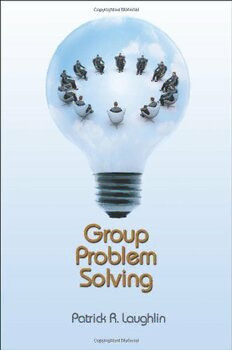
Group Problem Solving PDF
02011·3.937 MB·English
Most books are stored in the elastic cloud where traffic is expensive. For this reason, we have a limit on daily download.
Preview Group Problem Solving
Description:
Experimental research by social and cognitive psychologists has established that cooperative groups solve a wide range of problems better than individuals. Cooperative problem solving groups of scientific researchers, auditors, financial analysts, air crash investigators, and forensic art experts are increasingly important in our complex and interdependent society. This comprehensive textbook--the first of its kind in decades--presents important theories and experimental research about group problem solving. The book focuses on tasks that have demonstrably correct solutions within mathematical, logical, scientific, or verbal systems, including algebra problems, analogies, vocabulary, and logical reasoning problems.The book explores basic concepts in group problem solving, social combination models, group memory, group ability and world knowledge tasks, rule induction problems, letters-to-numbers problems, evidence for positive group-to-individual transfer, and social choice theory. The conclusion proposes ten generalizations that are supported by the theory and research on group problem solving. Group Problem Solving is an essential resource for decision-making research in social and cognitive psychology, but also extremely relevant to multidisciplinary and multicultural problem-solving teams in organizational behavior, business administration, management, and behavioral economics.
See more
The list of books you might like
Most books are stored in the elastic cloud where traffic is expensive. For this reason, we have a limit on daily download.
